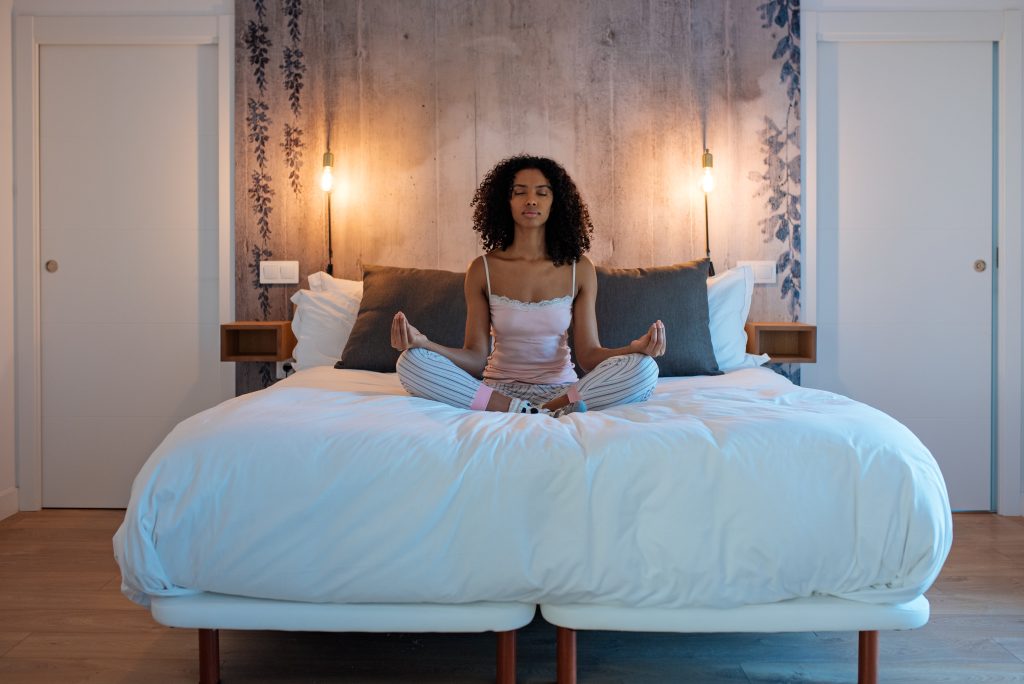Have you ever found yourself lying awake at night, thoughts racing, while sleep seems increasingly out of reach? Or perhaps you’ve noticed that after a poor night’s sleep, everyday concerns feel magnified and more challenging to manage. This common experience highlights an important health connection that affects many Australians: the relationship between sleep and anxiety.
Understanding the Sleep-Anxiety Connection
The relationship between sleep and anxiety is bidirectional – each can significantly influence the other. Recent research indicates that up to 40% of Australians aren’t getting adequate quality sleep, while approximately one in four Australians experience heightened anxiety levels that affect their daily lives.
How Sleep Affects Our Daily Wellbeing
Quality sleep influences several aspects of our daily functioning:
- Emotional regulation
- Stress response
- Decision-making ability
- Physical energy levels
- Information processing
- Memory consolidation

Common Sleep Patterns You Might Recognise
Many people experience various sleep-related challenges:
- Difficulty falling asleep despite feeling tired
- Waking frequently during the night
- Early morning waking without feeling refreshed
- Restless or light sleep
- Racing thoughts when trying to sleep
- Morning fatigue despite adequate hours in bed
Professional Insights into Sleep Health
Healthcare professionals often observe several factors that can influence sleep quality:
1. Environmental Factors
- Room temperature
- Light exposure
- Noise levels
- Bed comfort
- Air quality
2. Lifestyle Considerations
- Daily routine consistency
- Exercise timing
- Eating patterns
- Screen time habits
- Caffeine consumption
3. Wellbeing Factors
- Stress levels
- Daily activity balance
- Social connections
- Work-life integration
- Regular exercise

Practical Strategies for Better Sleep
1. Create a Sleep-Supportive Environment
Your bedroom environment plays a crucial role in sleep quality:
- Maintain a cool, dark, and quiet space
- Use comfortable, breathable bedding
- Remove unnecessary electronics
- Consider using white noise if helpful
- Ensure adequate ventilation
2. Develop a Consistent Sleep Routine
Establish regular sleep patterns:
- Set consistent sleep and wake times
- Create a calming pre-bed routine
- Allow time to wind down
- Practice relaxation techniques
- Maintain routine on weekends
3. Daytime Habits for Better Sleep
Your daily activities can significantly impact sleep quality:
- Get natural light exposure during the day
- Engage in regular physical activity
- Manage caffeine intake
- Stay hydrated throughout the day
- Practice stress-management techniques
Understanding Your Sleep Patterns
Keep track of these aspects to better understand your sleep:
1. Daily Sleep Diary
Note:
- Bedtime and wake time
- Sleep quality
- Night-time disturbances
- Morning energy levels
- Daytime activities
2. Pre-Sleep Routine
Monitor:
- Evening activities
- Screen time
- Food and drink consumption
- Relaxation practices
- Environmental factors
Professional Support for Sleep Health
Consider speaking with an AHPRA-registered healthcare professional if you experience:
- Persistent sleep difficulties
- Regular daytime fatigue
- Ongoing concerns about sleep quality
- Changes in sleep patterns
- Impact on daily functioning
Healthcare professionals can provide:
- Comprehensive health assessments
- Personalised management strategies
- Professional guidance
- Regular monitoring when needed
- Preventive health recommendations

Building Long-Term Sleep Health
1. Create a Sleep-Friendly Schedule
Establish routines that support quality sleep:
- Regular sleep-wake times
- Consistent meal timing
- Planned exercise sessions
- Dedicated relaxation periods
- Screen-free wind-down time
2. Monitor Sleep Influences
Pay attention to factors affecting your sleep:
- Stress levels
- Physical activity
- Nutrition choices
- Environmental conditions
- Social interactions
3. Implement Relaxation Practices
Incorporate calming activities:
- Gentle stretching
- Deep breathing exercises
- Mindful movement
- Quiet reflection
- Relaxing hobbies
When to Seek Professional Guidance
While everyone experiences occasional sleep changes, consider professional healthcare support if you notice:
- Persistent sleep difficulties
- Regular daytime fatigue
- Significant mood changes
- Reduced daily functioning
- Ongoing sleep concerns
Professional Healthcare Support
At GreenMed Care, our AHPRA-registered healthcare professionals understand the complex relationship between sleep and overall wellbeing. Through telehealth consultations, we can:
- Assess your current situation
- Discuss appropriate management strategies
- Provide personalised guidance
- Offer ongoing support when needed

Taking Action for Better Sleep
Start with small, manageable changes:
- Set consistent sleep and wake times
- Create a calming bedroom environment
- Establish a regular pre-sleep routine
- Monitor your sleep patterns
- Practice relaxation techniques
Remember, supporting your sleep health is an important aspect of overall wellbeing. If you’re experiencing ongoing sleep concerns, our AHPRA-registered healthcare professionals are available to provide professional guidance through convenient telehealth consultations.
Looking Forward
Improving sleep quality is a journey that combines understanding, practice, and sometimes professional support. Whether you’re looking to enhance your sleep quality or seeking support for specific sleep concerns, remember that professional healthcare guidance is available to help you develop strategies that work for your lifestyle.
For personalised advice about your sleep health, consider booking a telehealth consultation with our AHPRA-registered healthcare professionals. We’re here to support your journey toward better sleep and overall wellbeing.
